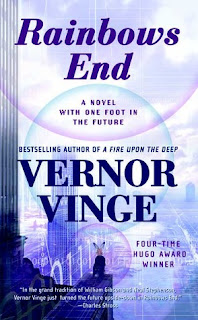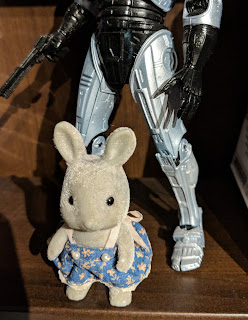Rainbows End
Rainbows End
Vernor Vinge, 2006
Hugo Winner - 2007
Premise: In the near future, advanced technology means new healthcare, new communications, new dangers, and old human problems.
I was intrigued by the beginning of this book, a bit ambivalent but still curious in the overstuffed meandering middle, and thoroughly disappointed in the sloppy end. It's probably one of those that I would have abandoned if it wasn't part of my "read all the Hugo winners" project.
I had three main problems by the end. One was mostly a function of when I read the book, but the other two were a fundamental failure to engage with the moral questions it posed and a refusal to reckon with its unlikeable main character.
The first problem I had with the book isn't so much a problem with the book as it is a problem with most near-future sci-fi. It was published in 2006. It's set in 2025. The advanced technology it proposes was plausible future tech in 2006, but isn't that related to the actual technology of today. Like, remember how people tried Google Glass and then decided we just wanted smartphones after all? Augmented and virtual reality have been "on the cusp" for so long that it's hard to picture them becoming the primary way EVERYONE interacts 24/7 with the world and each other anytime soon.
In the book, everyone controls their computers with their clothes/bodies and sees them on their contacts. The book doesn't directly address this connection, but everyone can do this partially because of the crazy-advanced medical technology that cures nearly everything and makes old people young. (We'll come back to that.) The augmented reality includes being able to choose to see different overlays on reality, including many based on recognizable IP.
One small thing that threw me right out of the story was a sizable digression about things that Terry Pratchett was doing involved with this worldwide collaborative virtual reality project in 2019. It's more bad luck than anything that Vinge chose to briefly highlight someone who would pass away in 2015, and in a notable manner. But even though the artists that were important to the plot were fictional, the whole warring-groups-of-fans-fighting-over-their-various-consensual-realities subplot made me roll my eyes. That part was plausible but insipid.
One way in which the book is more plausible is in the very beginning. An analyst detects a weird occurrence that may be a pilot for a mind-control technique. The reader finds out shortly that it is, and that one of the high-level people ostensibly trying to track down the mind control project is, in fact, the author of said project. Most of the plot is set in motion by a Rube-Goldberg-esque scheme in which he is setting up a secret investigation of the lab while at the same time planning to alter the data so that he can continue to hide the project.
In the second or so chapter, this character establishes his position -- that weapons of mass destruction are becoming too accessible to too many extremists, and so any technology that can make people not do that is justified. Now that is a fascinating question -- but it's one that the book completely abandons in favor of a bland and convoluted heist plotline. By the end, it might as well have been generic bad guy plot X.
My largest problem with the book, however, is the main character. There are characters in this story who might be interesting if they got more development. Robert is not one of them. He used to be a famous poet. Then he got Alzheimer's. Then he got cured. At the start of the book, he's just received some treatments that make him functionally young again and he has to learn how to get along in what to him is the future.
Oh, and he's an asshole. The book is clear on this point. He's lost his poetry mojo, and he's desperate to regain it, so he can go back to being a supercilious asshole. By the end I think the book wants to redeem him, by not getting his talent back, protecting his granddaughter (once when he's out of his mind on weird nerve gas and thinks she's his sister), and being a halfway decent person to a kid who tries to help him (after being an asshole over and over). It doesn't have his son or his ex-wife forgive him, which I was relieved by, but I felt like as the reader I was supposed to hope that his ex-wife would talk to him again sometime after the book ends. Now that he's chaaaanged.
Which. No. Girl, just block that dude. He wants to be better, that can be something he does on his own time and far away from you.
But the only characters who get resolutions after the plot collapses under its own weight get them in the context of Robert. I hate Robert. You don't learn about any of the interesting things happening in this world, because you're stuck following Robert.
For making me angry with failed potential, this book gets:
1 Star - Didn't Like It



Comments
Post a Comment
FYI: Most comments are moderated, and will not appear immediately.